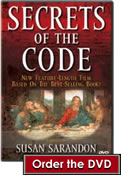 |
Secrets of the Code
A Documentary Journey into the
Heart of The Da Vinci Code…and Beyond
 New York Times best-selling author Dan Burstein and Academy Award nominated documentary filmmaker Jonathan Stack have teamed up to create a fascinating, provocative, and emotionally gripping feature-length documentary based on Burstein’s Secrets of the Code (six months on the New York Times bestseller list; over two million sold worldwide). Narrated by Academy Award-winning actress Susan Sarandon, this film takes viewers on a journey at once sacred and profane. Secrets of the Code wrestles with the complex historical and religious issues at the heart of the novel, The Da Vinci Code, and presents these issues from many diverse perspectives. At the same time, Secrets of the Code casts a wide net, delving into universal issues about the nature of belief, faith, spirituality, and religion.
New York Times best-selling author Dan Burstein and Academy Award nominated documentary filmmaker Jonathan Stack have teamed up to create a fascinating, provocative, and emotionally gripping feature-length documentary based on Burstein’s Secrets of the Code (six months on the New York Times bestseller list; over two million sold worldwide). Narrated by Academy Award-winning actress Susan Sarandon, this film takes viewers on a journey at once sacred and profane. Secrets of the Code wrestles with the complex historical and religious issues at the heart of the novel, The Da Vinci Code, and presents these issues from many diverse perspectives. At the same time, Secrets of the Code casts a wide net, delving into universal issues about the nature of belief, faith, spirituality, and religion.
The film is a visceral, sensory experience, traveling upriver into the primal moments of the human narrative. From 30,000 year-old prehistoric artworks devoted to the spirit of the Sacred Feminine in France to early Christian imagery about life and death found in the catacombs of Rome; from the mysteries about Mary Magdalene and her relationship with Jesus discovered in the church at Rennes-le-Château, to the coded messages of Rosslyn Chapel in Scotland; from the peaceful spot on the Sea of Galilee where Mary Magdalene may have been born to the apocalyptic Holy Land location of Armageddon where some believe the end of days will occur, Secrets of the Code turns its viewers into participants in the ever-evolving set of historical accounts, stories, and narratives that are crucial to understanding why The Da Vinci Code touched such a deep human nerve and why the debate continues.
Among the specific issues that Secrets of the Code explores are these:
- Was Jesus married to Mary Magdalene and what do alternative gospel accounts tell us about their relationship?
- Did the Church intentionally denigrate the role of Mary Magdalene in order to minimize the role of women?
- Is Christianity as we know it a Roman distortion of the actual teachings of Jesus, designed to promote the Empire’s values of patriarchy and hierarchy?
- Have we been mistaken for twenty centuries about the true nature of the Holy Grail? Could Jesus and Mary Magdalene have had a child together?
- Did geniuses in the arts and sciences, such as Leonardo Da Vinci and Isaac Newton, belong to secret societies that concealed and continue to protect the most compelling “insider” information in history?
Among the informed experts and intriguing locations we encounter in Secrets of the Code:
Elaine Pagels, Princeton professor and author of The Gnostic Gospels and many other books exploring the thinking of early Christian thinkers whose writings did not make it into the accepted versions of the Gospel accounts…Bart Ehrman, leading academic focused on lost scriptures and gospels…Rabbi Irwin Kula, expert on Kabala and the Jewish mystical tradition…Father O’Collins, Catholic Church scholar…Neil deGrasse Tyson, astrophysicist…Lynn Picknett and Clive Prince, occult writers who initiated several of the theories used in The Da Vinci Code…Silas, a real-life member of Opus Dei...Richard Leigh, co-author of Holy Blood, Holy Grail…John Allen, Vatican expert and author of the most extensively researched book about Opus Dei…Jean-Luc Robin, expert on Rennes-le-Château, Templar and Cathar legends…Timothy Freke, provocative thinker and author who has reinterpreted Christianity in light of theories about the sacred feminine and the human quest for spiritual knowledge…Sharon Newman, academic expert on the historical issues in The Da Vinci Code…John Matthews, expert on the history of the search for the Holy Grail…Duncan Caldwell, expert on the sacred feminine in prehistory…Elizabeth Lev, scholar working on the history of early Christianity…Caitlin Matthews, expert on early Christian history and symbology…Olivia Decker, owner of the real-life Château Villette…Anna Fedele, expert on Mary Magdalene shrines and sites in France…Joe Zias, leading archeologist, working on major Israel sites...Stuart Mitchell, composer and decoder of the musical mysteries of Rosslyn Chapel…and many more.
The Da Vinci Code is now part of the culture. This has less to do with its plot than with the fact that it raises fundamental and haunting questions about truth and reality, about the meaning of belief itself. Secrets of the Code takes it as gospel, so to speak, that people yearn to make sense of their lives and of existence in general. How they do this may differ from individual to individual, but ultimately anyone who seeks meaning in life is engaged on a spiritual quest. Secrets of the Code will be a memorable stop on that journey.
